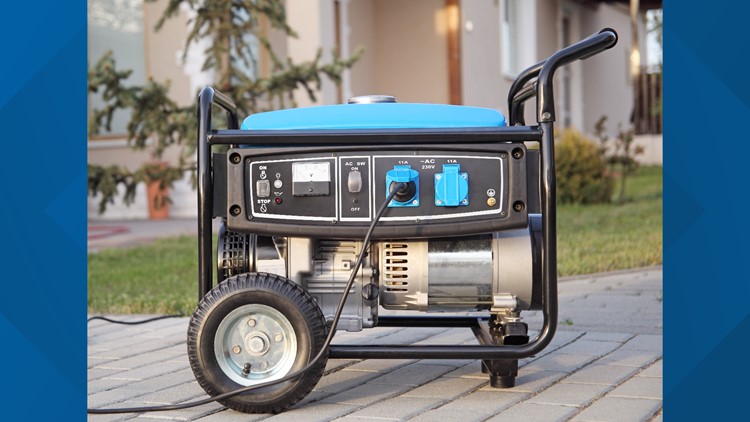WASHINGTON — While the snow may have stopped for now, cold temperatures aren't going anywhere and while you may be tempted to do anything to keep your home warm and toasty, a common option could come with deadly consequences.
Portable generators are internal combustion engines that are used to generate electricity. They are helpful in times when the power is out but should never be brought inside homes, garages, crawlspaces, sheds or other small areas.
According to the EPA, portable generators put out deadly levels of carbon monoxide (CO) which can quickly build up in small spaces and linger for hours, even after the generator has been turned off. Because these fumes are impossible to see, taste or smell, CO can kill you before you are even aware it is in your home.
In January 2022, two brothers died in their Brandywine, Maryland home. Family members told WUSA9 the pair died from carbon monoxide poisoning after using a generator to heat and power their home during an extended power outage.
The effects of CO exposure can vary greatly from person to person depending on age, overall health and the concentration and length of exposure. The most common symptoms of CO poisoning are headaches, dizziness, weakness, upset stomach, vomiting, chest pain and confusion. The CDC says people who are sleeping or drunk can die from CO poisoning before they even have symptoms.
The CDC reports more than 400 Americans die from unintentional CO poisoning not linked to fires, more than 100,000 visit the emergency room, and more than 14,000 are hospitalized each year.
While you may think opening a window will help, the American Red Cross says fans and open windows will not prevent a CO buildup in the home and the best way to avoid it is to keep your generator outside and install a CO alarm in your home.
Below is a list from the CDC of ways to prevent CO poisoning in your home:
- Install a battery-operated or battery back-up CO detector in your home. Check or replace the detector’s battery when you change the time on your clocks each spring and fall. Place your detector where it will wake you up if it alarms, such as outside your bedroom. Consider buying a detector with a digital readout. This detector can tell you the highest level of CO concentration in your home in addition to alarming. Replace your CO detector every five years.
- Have your heating system, water heater, and any other gas, oil, or coal-burning appliances serviced by a qualified technician every year.
- Do not use portable flameless chemical heaters indoors.
- If you smell an odor from your gas refrigerator have an expert service it. An odor from your gas refrigerator can mean it could be leaking CO.
- When you buy gas equipment, buy only equipment carrying the seal of a national testing agency, such as Underwriters’ Laboratories.
- Make sure your gas appliances are vented properly. Horizontal vent pipes for appliances, such as a water heater, should go up slightly as they go outdoors, as shown below. This prevents CO from leaking if the joints or pipes aren’t fitted tightly.
- Have your chimney checked or cleaned every year. Chimneys can be blocked by debris. This can cause CO to build up inside your home or cabin.
- Never patch a vent pipe with tape, gum, or something else. This kind of patch can make CO build up in your home, cabin, or camper.
- Never use a gas range or oven for heating. Using a gas range or oven for heating can cause a build-up of CO inside your home, cabin, or camper.
- Never burn charcoal indoors. Burning charcoal – red, gray, black, or white – gives off CO.
- Never use a portable gas camp stove indoors. Using a gas camp stove indoors can cause CO to build up inside your home, cabin, or camper.
- Never use a generator inside your home, basement, or garage or less than 20 feet from any window, door, or vent.
- When using a generator, use a battery-powered or battery-backup CO detector in your home.
Do you have a news tip on this story or any other story? We want to hear from you. Tell us about it by emailing newstips@wusa9.com.
MORE WAYS TO GET WUSA9
DOWNLOAD THE WUSA9 APP
Apple App Store: WUSA9 News on Apple
Google Play Store: WUSA9 News on Android
HOW TO ADD THE FREE WUSA9+ APP TO YOUR STREAMING DEVICE
ROKU: add the channel from the ROKU store or by searching for WUSA9.
For both Apple TV and Fire TV, search for "WUSA9" to find the free app to add to your account. Another option for Fire TV is to have the app delivered directly to your Fire TV through Amazon.
SIGN UP TO RECEIVE WUSA9 NEWSLETTER
Subscribe to our daily WUSA9 Newsletter for top stories from WUSA9 curated daily just for you. Get content and information right now for can’t-miss stories, Commanders content, weather, and more delivered right to your inbox.



